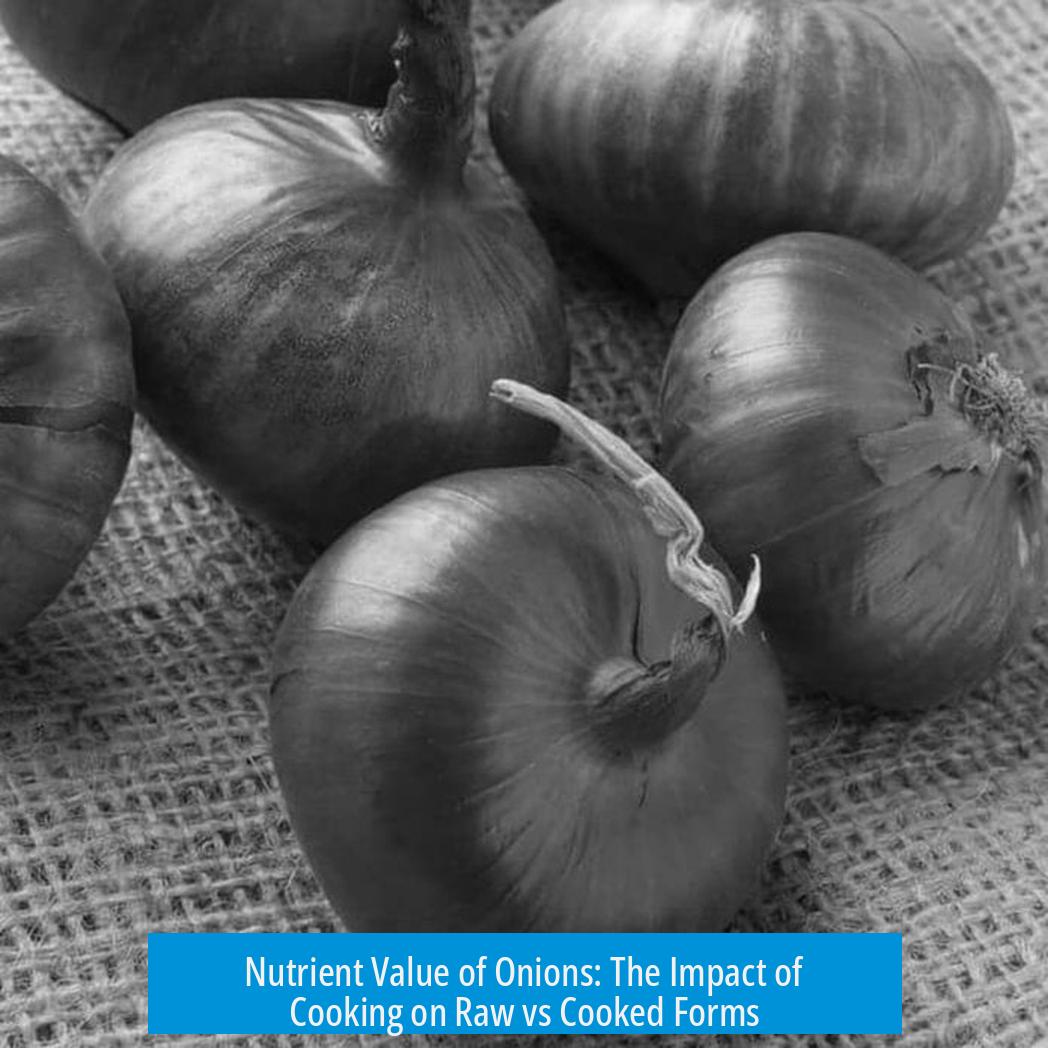Does the Nutrient Value of Onions Change When Cooked Versus When Eaten Raw?
The nutrient value of onions experiences both losses and changes when cooked compared to raw. While the caloric content and basic nutrients remain mostly stable, specific heat-sensitive compounds decrease. Enzymes and antioxidants degrade during cooking, but certain compounds become more bioavailable, and flavor profiles improve remarkably.
Caloric Content and Basic Nutrients: Minimal Change
The overall calorie count in onions, along with their carbohydrate and mineral content, does not vary much between raw and cooked forms. Whether eaten fresh or subjected to heat, onions provide similar amounts of these fundamental nutrients.
- Calories remain essentially constant whether raw or cooked.
- Carbohydrates, minerals, and fiber show negligible changes.
- Minor variations might be due to water loss during cooking.
Thus, from a basic nutrition standpoint, cooking onions does not drastically alter energy or mineral delivery.
Vitamin C and Antioxidants Decrease on Cooking
Onions contain ascorbic acid (vitamin C) and several antioxidants. Both categories degrade due to the thermal instability of many sulfur-containing compounds present in the vegetable.
- Vitamin C is sensitive to heat and oxygen, causing reduction during cooking.
- Antioxidant compounds, particularly sulfurous ones, also diminish.
- These losses slightly reduce onions’ protective health effects related to oxidative stress.
While the decrease in vitamin C and antioxidants is measurable, it is not alarming unless onions are a primary source of these nutrients.
Enzymatic Activity and Sulfur Compounds Change with Cooking
Raw onions boast an enzyme named alliinase. This enzyme catalyzes the conversion of cysteine sulfoxides into thiosulfinates, which contribute to health benefits such as antimicrobial action and cardiovascular protection.
- Raw Onions:
- Alliinase is active when onions are cut or crushed.
- Thiosulfinates form quickly, offering potent health-promoting effects.
- Cooked Onions:
- Heat deactivates alliinase, halting thiosulfinate formation.
- Thiosulfinates are themselves heat unstable and break down.
- The distinctive pungency linked to these compounds diminishes.
The absence of these active sulfur compounds in cooked onions means losing some unique health benefits associated with raw onion consumption.
Bioavailability: How Cooking Affects Nutrient Absorption
Bioavailability refers to the degree to which nutrients can be absorbed and utilized by the body. While the quantity of some onion nutrients remains stable, cooking alters bioavailability variably.
- Cooking can enhance bioavailability by breaking down cell walls.
- Some nutrients may become easier to absorb in cooked onions.
- Conversely, heat-sensitive vitamins decrease in availability.
- Specific data on onions’ nutrient bioavailability after cooking is limited.
For example, cooked eggs provide more accessible protein than raw. It is reasonable to suspect some nutrient absorption in onions changes with cooking, though exact figures are unknown.
Culinary and Sensory Impact of Raw Versus Cooked Onions
Cooking changes onions’ flavor and texture, which affects their culinary use and some digestive responses.
- Raw onions: crisp, pungent, sharp; may cause bloating in some individuals.
- Cooked onions: soften, sweetness intensifies, umami flavor develops.
- Cooking releases glutamate, increasing savory taste in soups, stews, and gravies.
Many dishes benefit from cooked onions due to enhanced depth of flavor, while raw onions add brightness and crunch to salads and garnishes.
Additional Uses of Raw and Cooked Onions
Beyond nutrition, onions serve practical purposes in cooking and food preparation.
- Fresh onion juice acts as a natural meat tenderizer via proteolytic enzymes.
- This juice imparts a distinct onion flavor to tougher cuts of meat.
- Cooked onions contribute to slower, long-duration flavor release in dishes.
These culinary properties make onions versatile in raw and cooked forms, balancing nutritional and sensory effects.
Summary of Nutrient Changes in Onions from Raw to Cooked
| Nutrient/Property | Raw Onions | Cooked Onions |
|---|---|---|
| Caloric Content and Macros | Stable, minimal change | Stable, minimal change |
| Vitamin C (Ascorbic Acid) | Higher content; heat sensitive | Significant decrease due to heat degradation |
| Antioxidants (Sulfur Compounds) | Present, includes thiosulfinates | Reduced; heat deactivates enzymes and compounds |
| Enzyme Activity (Alliinase) | Active; forms beneficial compounds | Inactivated by heat, no thiosulfinate formation |
| Bioavailability | Variable; enzyme-mediated compounds active | May increase or decrease; exact effect unclear |
| Flavor Profile | Pungent, sharp | Sweet, umami-rich |
Key Takeaways
- Caloric and mineral contents remain mostly unchanged by cooking onions.
- Heat reduces vitamin C and sulfurous antioxidant compounds significantly.
- Raw onions have active enzymes producing healthful thiosulfinates, lost during cooking.
- Cooking alters nutrient bioavailability, though exact impacts on onions are less defined.
- Cooking enhances umami flavor through glutamate release, improving palatability.
- Both raw and cooked onions offer distinct nutritional and culinary advantages.
Does cooking onions reduce their vitamin C content?
Yes, cooking lowers vitamin C levels because ascorbic acid is heat sensitive. Raw onions retain more vitamin C than cooked ones.
What happens to the enzyme alliinase in onions when cooked?
Alliinase is deactivated by heat. This stops the production of thiosulfinates, which are compounds linked to health benefits in raw onions.
Do cooked onions have the same minerals and calories as raw onions?
Yes, the mineral and calorie content stays mostly the same whether onions are raw or cooked.
Is nutrient absorption different between raw and cooked onions?
Bioavailability can change with cooking. While some nutrients decrease, others might become easier to absorb. Specific data for onions is limited.
How does cooking affect the flavor and digestion of onions?
Cooking boosts glutamate, increasing umami flavor. Raw onions can cause bloating for some people, while cooked onions are often gentler on digestion.





Leave a Comment